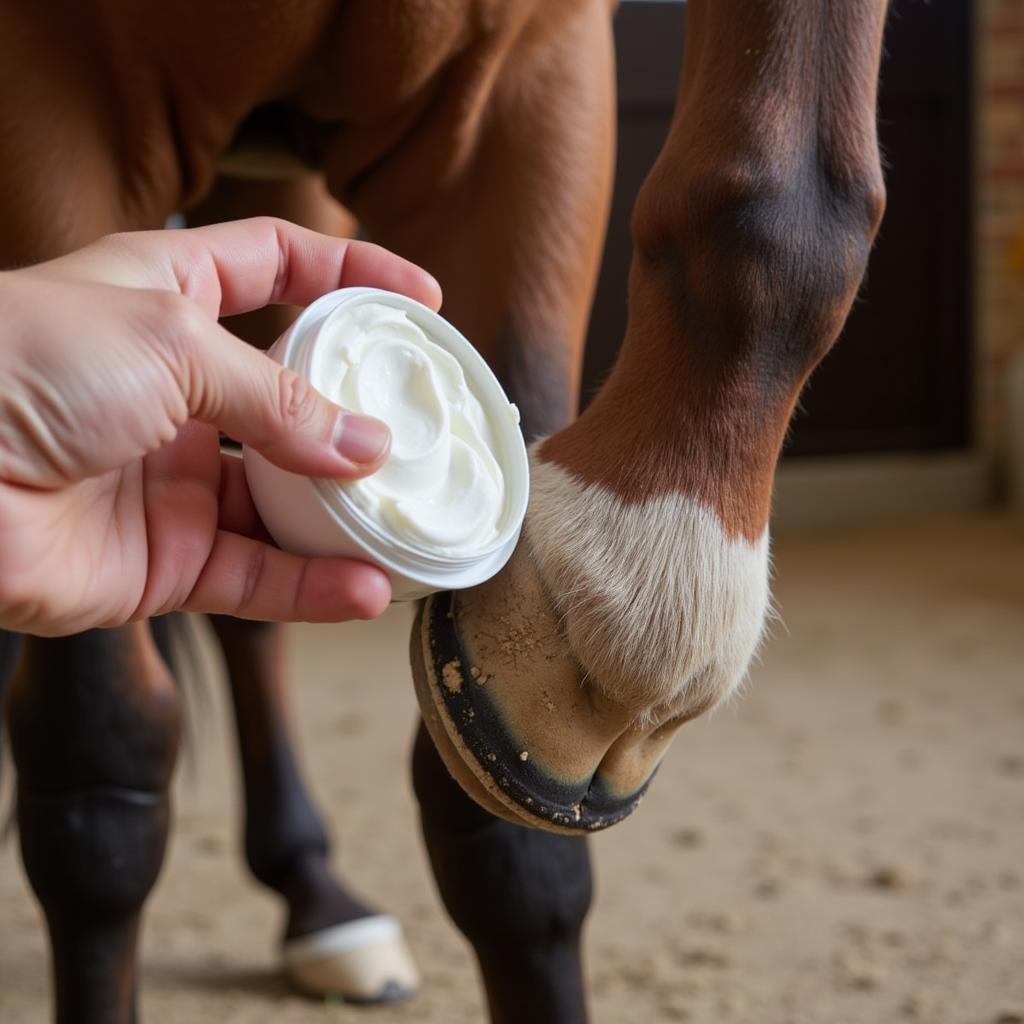Udder cream for horses is a topic that often raises questions amongst horse owners. This article delves into the various aspects of using udder cream on horses, exploring its benefits, potential risks, and best practices for application. We’ll cover everything you need to know about this common equine care product.
What is Udder Cream and Why Use it on Horses?
Udder cream, typically formulated for cows, is sometimes used on horses to soothe and protect irritated skin. It often contains emollients like lanolin and petrolatum that can moisturize dry, chapped skin, particularly on the udder and teats of lactating animals. Horse owners might consider using udder cream for similar reasons, such as treating chapped heels, sunburns, or minor abrasions.
 Applying Udder Cream to Horse's Chapped Heels
Applying Udder Cream to Horse's Chapped Heels
Benefits and Risks of Using Udder Cream on Horses
While udder cream can offer some benefits for horses, it’s crucial to understand the potential risks. The moisturizing properties can provide relief from dry, itchy skin and promote healing of minor wounds. However, some ingredients found in udder cream may not be suitable for horses. Certain formulations contain ingredients that could be toxic if ingested, particularly if the horse licks the treated area. Additionally, some udder creams contain antibiotics or other medications that are not intended for equine use.
Choosing the Right Udder Cream for Your Horse
When selecting an udder cream for your horse, opt for formulations that are specifically designed for equine use or clearly labeled as safe for horses. Avoid products containing antibiotics or other medications unless specifically prescribed by a veterinarian. Look for creams with natural ingredients like aloe vera, lanolin, and beeswax, which are generally safe and effective for moisturizing and soothing equine skin.
How to Apply Udder Cream to Horses
Before applying udder cream, thoroughly clean the affected area with mild soap and water. Dry the area completely. Apply a thin layer of udder cream to the affected skin, gently massaging it in. Avoid applying excessive amounts, as this can attract dirt and debris. Repeat application as needed, typically once or twice daily.
When to Consult a Veterinarian
While udder cream can be beneficial for minor skin irritations, it’s essential to consult a veterinarian if the condition doesn’t improve or worsens. If the skin becomes inflamed, infected, or excessively itchy, professional veterinary advice is crucial. Your veterinarian can determine the underlying cause of the skin issue and recommend the most appropriate treatment.
Alternatives to Udder Cream for Horses
Several alternatives to udder cream can effectively address skin issues in horses. Equine-specific skin balms and ointments are formulated to address common equine skin problems. These products are often available at tack shops and online retailers. Consult your veterinarian for recommendations on suitable alternatives based on your horse’s specific needs.
Conclusion
Udder cream can be a useful tool in managing minor skin irritations in horses, but it’s crucial to select the right product and apply it correctly. Always prioritize equine-specific formulations or those clearly labeled as safe for horses. Consult your veterinarian for any persistent or worsening skin conditions to ensure proper diagnosis and treatment. By understanding the benefits, risks, and proper application techniques, you can effectively use udder cream to support your horse’s skin health.
FAQ
- Can I use any udder cream on my horse? No, use only equine-specific or horse-safe udder creams.
- How often should I apply udder cream? Apply a thin layer once or twice daily, as needed.
- What should I do if my horse licks the udder cream? Consult your veterinarian if you are concerned about potential ingestion.
- Can udder cream treat all skin conditions in horses? No, consult a veterinarian for persistent or severe skin issues.
- Are there alternatives to udder cream for horses? Yes, equine-specific skin balms and ointments are available.
- What are the signs of an adverse reaction to udder cream? Increased inflammation, itching, or discharge should be checked by a vet.
- Where can I buy equine-safe udder cream? Check tack shops, online retailers, or your veterinarian.
For further support, please contact us: Phone: 0772127271, Email: [email protected], or visit us at QGM2+WX2, Vị Trung, Vị Thuỷ, Hậu Giang, Vietnam. We have a 24/7 customer service team.